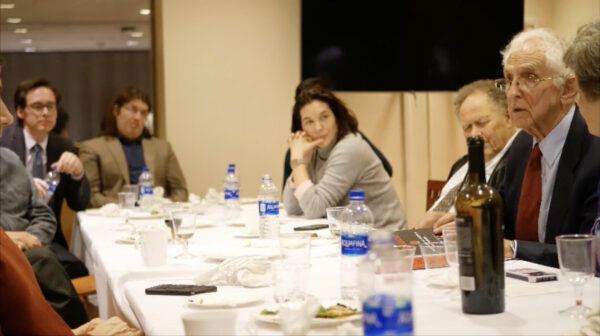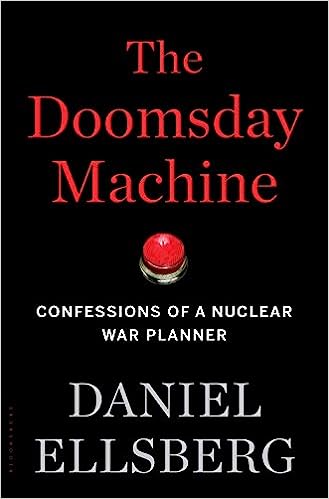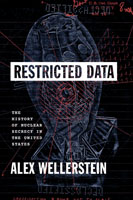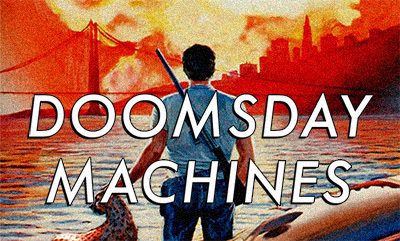When I learned several months ago that Daniel Ellsberg had pancreatic cancer, and was opting not to treat it, I was not quite sure what I ought to do. I consider it a great honor that I got to spend several days with Ellsberg, a few years back, and was periodically in touch with him since then. I’d like to think he was something of a friend, though I never knew him deeply or for that long of a time.
After thinking on it for several days, and feeling conflicted, and talking about it with a friend whose life experience exceeds mine by almost five decades, I opted not to reach out to him when I heard the news — I figured he had a lot more on his plate as it was, that he would be wanting to spend his final days with his family, close friends, and his final attempts at advocacy, and I couldn’t think of anything I would tell him that wouldn’t feel either maudlin or better said by others. Whatever one thinks of him, he is a world-historical figure, and I’m honored just to have met him.

Daniel Ellsberg holding forth at a dinner that was part of a 2018 workshop at the Stevens Institute of Technology on “The President and the Bomb” that was sponsored by the Ploughshares Fund. Dan was supposed to speak for 20 minutes or so but instead spoke for about 2 hours… but it all pretty interesting, if a bit taxing!
But I also felt like I ought to do something, just to commemorate him. I had hoped to maybe do that something while he was still alive, but I knew he was on a tight clock, and my own life didn’t really give me a lot of free time last spring.1 So what I resolved to do was to go over his final book, The Doomsday Machine: Confessions of a Nuclear War Planner (Bloomsbury, 2017), in some very close detail, and write something about it.
I had gone over his book when it first came out, in part in preparation for talking to him about it (which I did at some length in 2018), but I had always wanted to really, truly dig into it, and to write something about it. Discussions I had with other scholars, and observations about what was and wasn’t said about the book on Twitter, in conferences, etc., made me feel that the book and its arguments had not really been taken all that seriously by serious students of nuclear history, international relations, or nuclear policy. I had long wanted to write an essay about the book, with the hope of both potentially stimulating more serious academic interest in it — because I do believe it deserves to be taken seriously, even if it (like all books, and especially memoirs, of which it mainly is) need not be taken uncritically — and also applying the lens of someone who has had the time and luxury to try and seriously study many of the events and issues that the book engages with and, in some places, makes rather radical arguments about.
My hope was that perhaps I would be able to write this essay while Dan was still alive, and get his feedback on it, or perhaps have him answer any lingering questions I had. That obviously did not happen: I finished my deep read of his book today, June 16, 2023, a few hours before I saw his obituary in The Washington Post. (Deep sigh.)
One might think that I might feel regret at being too slow (and I knew, of course, that this was a possibility), but for whatever reason, this feels right and appropriate. It would have been nice to ask him questions, and get his responses to my thoughts, but I also would have felt guilty about burdening him with potentially something else to do in his final days, and possibly be faced with the awkwardness of disagreement, perceived critique, and, of course, the painful (to me) difficulty of talking about death and legacy.
For me, I think this is fine. I don’t think Dan would have minded this turn of events, though I am sure he might have enjoyed it if I had written the essay some time back, too. I think he’d be happy that I was spurred into action, one way or the other. So I am using Dan’s very recent death as the stimulus to write finally write all of this up, about an hour or so after I learned of his death. What I am going to do, over the next week or so, is write a series of posts on Dan Ellsberg and The Doomsday Machine. This is the first of an unknown number — I’m winging it, and this is going to be written with a hot pen. Rest in Peace, Dan. Thank you.
The Question of Memory
The introduction to The Doomsday Machine lays out a description of the overall context of the book: that Ellsberg had really identified nuclear war planning as the truly dangerous “secret” that the US and global public needed to know about, and that it was the issue that radicalized the one-time RAND Corporation analyst into becoming a whistle-blower. The Pentagon Papers were just going to be the “first taste” of his activities, something important and topical and immediate, and would be followed up with more leaks. Due to a combination of circumstances, this didn’t happen. The documents he had cached about nuclear war plans were irrevocably lost in the wake of the Pentagon Papers (his brother hid them a little too well, and they now are likely buried under a housing development), and life took him in other directions.
I did get a chance to ask Ellsberg in person why he had waited almost 50 years to write this book, if it was really the true message. To be sure, it’s not like Ellsberg didn’t get involved with nuclear weapons activism in the intervening time, and he did talk about some of the things in the book prior to it (some of its novelty was, I suspect, part of the publicity pitch for the book), but still, it is a long time to sit on something. I didn’t really find his answer all that compelling: he said he had found that publishers weren’t that interested in books about nuclear weapons. That’s a little hard to believe, given how many books have been published on the topic since the 1970s, and one would think the nuclear war fears of the 1980s would have been more than adequate to convince some publishers that the guy behind the Pentagon Papers could sell a few books. And yes, he did lose the documents he intended to leak — but so what? He had kept (he told me) extensive notes from the 1970s on these topics (these notes are what he based a lot of the book on), his memory for these things (even in his 80s, when I met him) seems almost eidetic, and even just as a “memoir” it seems like it would have an audience.

I admit that Dan’s book cover was one of the examples I gave to my press for guidance on the aesthetics for the cover of my own book: dark, cool, no mushroom clouds or over-the-top SECRET stamps.
I suspect the real reason is a little more complicated, aside from the fact that clearly he had decided to live his life a bit after the attempts by the Nixon administration to put him in prison for the rest of his life. He clearly believed that his nuclear secrets were far more dangerous to his own freedom than the Pentagon Papers had been — and he was probably right about that. Despite his longstanding advocacy for the importance of whistleblowers, I got the sense when meeting him that he had decided to prioritize his family a bit more once he was truly free (one thing he said in person that stuck with me was that he pointed out that the divorce rate for whistleblowers was extremely high, and he was incredibly happy and grateful than he was still with his wife), and while the kind of activism he did after Pentagon Papers case did lead to him getting arrested a few times as a protester, it was not the sort of thing that would lead to him living out his days in a Supermax. I suspect he felt that publishing a book that mostly described events over 50 years after the fact (most of the book is about the 1950s and 1960s) was a lot safer than publishing it when many of the people in it were still alive and somewhat influential, and that prosecuting an octogenarian for espionage would be less likely. And the context of the Trump administration spurred him to dive back into this topic, just as it spurred the publishers and audiences of people who suddenly rediscovered nuclear threats.
I would also note that the book as published could not have been published a whole lot earlier than it did, because it is not just a memoir. It is really an odd hybrid of memoir, historical narrative (which occasionally dips into the memoir, but is often quite independent from Ellsberg’s lived experiences), and moral appeal. The historical narrative parts clearly required a lot of research on Ellsberg’s part over the years, and even the memoir sections derive a lot of their utility from the fact that he was able to compare his perception of things with what we now know about them — for example, he readily admits that the Cuban Missile Crisis as he experienced and perceived it was entirely different from what was later revealed (in the 1990s and later) to have happened. So it would have been a much more limited book if he had published it in the 1970s or 1980s, although its proximity to the events of the memoir would have been closer.
How much should we trust Ellsberg’s memory? This is a question I’ve seen pitched by scholars informally. A historian will instinctively reply: not much. Memory is fickle, and constantly revised for both self and others. It doesn’t mean you can’t listen to memory, but you want to corroborate as much as possible. The fact that nearly everyone else mentioned in Ellsberg’s book is dead makes it very hard to get any easy corroboration, and the fact that many of the events and documents are still highly classified doesn’t help, either.
That being said, I did find it very useful to learn that he had made extensive notes on these matters in the 1970s, so the bulk of a lot of this narrative is not actually +50 years old distant from the events in question, but more like 10-20 years distant. That is still some time, of course. He also did have some documents from this topic squirreled away — when I visited his home in 2018 with Avner Cohen, we were both impressed by the cavernous library, document hoard (including the aforementioned notes), and workspace he had underneath his home. He did release some of those documents on his website promoting the book, some of which are technically “leaks” in that he released un-redacted versions from his personal files (but they are not nearly as “spicy” as the ones he wanted to release).
As noted already, I did get to spend some time talking with Ellsberg in person, both socially (several lunches and dinners), in a workshop setting, and at his home for a very long interview I conducted with Avner Cohen in 2018. I was, to say the least, very impressed by him. To contextualize that, let me say that I am not inherently impressed by people seeming to “know their subject well”: as someone who writes and teaches and gives a lot of talks, I know how easy it is, after awhile, to seem like you always have “all the facts at hand.” People are frequently impressed with how good they think my memory must be, but I know that a) I forget things (or details, or get things wrong) all the time when I don’t re-check them, b) I don’t think I have a much better memory than anyone else (and for some things, like numbers, my memory is probably worse than average, because my brain just can’t seem to “hold” numbers very well), and c) anything you spend a lot of time explaining to other people, and in effect engaging with on a sustained and detailed basis, will get really tightly “encoded” in your brain without you really trying. As I like to put it, almost everyone has a great memory regarding the things they do every day, and in my line of work, that means historical details.
So with that as a preamble, I will say: I was impressed in particular by Dan’s ability for recall. He appeared to have a level of recall much better than average. I don’t think he was faking it, or hallucinating details, or just knew things because he engaged with them on a daily basis. He seemed to be able to accurately recall exact dates, exact subject lines on memos, exact wording. He seemed to do so effortlessly and earnestly — he didn’t seem like it was trying to impress me or others, this was just how he got his point across. I have talked with people who have known him longer than I have who reported that this was always the impression of Dan, this superhuman quickness of memory and thoroughness, and that his ability in his 80s was not nearly as good as it used to be, but was still superhuman.2
So I actually rate Ellsberg’s ability to recall his memories of experiences, documents, etc., pretty high. That does not mean his memories are accurate — an important distinction. But I believe that the book earnestly and probably with high-fidelity reports things as Ellsberg experienced them. Its recollections need to be subjected to scrutiny and, I would like to hope, become the basis of efforts at corroboration, especially for the most controversial and perhaps most important sections. But they should not be dismissed outright, however fantastical or (at times) self-centered they might appear. I think, frankly, this is what Dan would want: there is nothing about him, or his book, that makes me think that he wants us to accept his narrative on his authority alone. Indeed, as I’ll get to, his entire stated goal of the book — which I believe him on — is that it ought to generate extensive efforts to look into the truth of these matters.
Next time: Looking at Ellsberg’s claims about the delegated authority under Eisenhower and Kennedy
- If I’ve seemed “off the radar,” it isn’t just a perception. The last year was intensely busy in term of teaching and service. Busier, and more generally taxing, than usual, for a lot of reasons. I am now, however, on both my summer “break” as well as beginning a year-long sabbatical, and I find that my reaction to that has been to throw myself into research in an almost frenzied way, working essentially non-stop, seven days a week, and being utterly happy with that change of pace. Many of these efforts will only bear fruit in a year or so, but some of them will be wrapping up projects this summer that have been in a holding pattern for a while. [↩]
- “Superhuman” is, of course, hyperbolic — Dan was quite human. But I have, over the years, met several Nobel Prize winners, top-tier academics, a few policymakers who were renown for their abilities, etc., and found that most people of this sort do not give me the impression of being “superhuman” in their cognitive abilities. I don’t mean this as any kind of self-flattery (or self-deprecation), just that when I spend time with these people I come away with the impression that they are smart but specialized, or smart but very-well trained, or smart but have a mental “trick” that is very productive (e.g., a question they ask or method they use that isn’t at all obvious, but usually yields interesting results, and once you realize what they are doing, you could imagine replicating this approach yourself and getting similar sorts of answers — a lot of “academic intellects” fit into this category, I find), and not with the idea that their brain works fundamentally different form other “smart” people I’ve met. I’ve only met two or three people who gave me the impression that their brain just worked fundamentally faster and more generally impressive than the generally “smart,” and gave me some insight into the awe that all of the other scientists of his day had for someone like John von Neumann, who made them all feel like second-raters. Dan is one of this small group of people I’ve met face to face who impressed me as having a brain on a much more “accelerated” template than normal “smartness.” It could be exhausting, too — once he got going, he didn’t want to stop telling you what he thought was important! But more than a few of us are guilty of that… [↩]




Looking forward to it, Alex!
I am buying the book.
As always Alex…
I very much enjoy reading your articles.
I’m glad you focused on the Doomsday Machine, rather than the Pentagon Papers. I always thought the Pentagon Papers was much ado about nothing. It merely confirmed what antiwar demonstrators had been preaching. It was interesting to learn that McNamara agreed with us, but that turned out not to be helpful information. The war dragged on.
On the other hand, what Ellsberg had to say about nuclear war was truly shocking. I thought, Man, that’s the book you should write. Tell us something we don’t already know. I heard the story about his lost documents, and assumed the book would never come out.
I spent the 1980s touring North America and Great Britain with a slide-show lecture based on my understanding of the Ellsberg nuclear war analysis, using the title First Strike Nuclear Warfare. I didn’t have enough information to write a book. And then, behold, decades later, Ellsberg published the Doomsday Machine. He finally wrote it all down. But did anybody read it?
In my view, the Doomsday Machine should be his legacy. You’re the historian. Maybe you can have success promoting that idea.
Also, he was a great man. I’m sorry he’s no longer with us.
Thanks, Howard. It’s interesting, because Dan himself thought that the urgency of the Pentagon Papers, for an ongoing war, made them necessary to get out first, but that he ultimately agreed they were NOT as important as the nuclear war issue, because that was truly existential and what he had seen truly terrified him. And he believes (as you know, if you read his book) that a lot of the Nixon’s administration’s exaggerated reaction to the Pentagon Papers (like Kissinger calling him “the most dangerous man in America”) was actually because they feared he would or could reveal information about their nuclear threats and war plans. So Dan would totally agree with your assessment of the relative importance, but as you note, waiting 50 years made the latter seem less important to him and others.
One of my reasons for interviewing with Dan at length, and finally writing this all up myself, is that I do think his nuclear work should ultimately become a huge part of his legacy. Maybe not displacing Pentagon Papers altogether, but it shouldn’t be a footnote!
Great review. And yes, tell us what you think of the history Dan Ellsberg covered…
The first thing I think of, after reading his book, is his telling of exiting a theater after viewing Doctor Strangelove and commenting that what he’d just seen was not fiction but documentary.